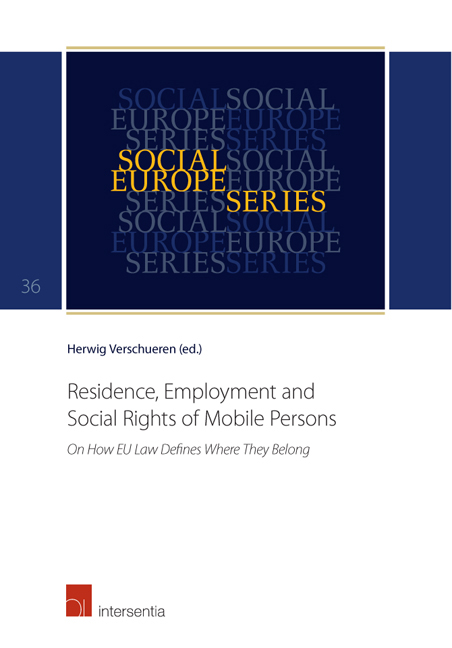Book contents
- Frontmatter
- Preface
- Contents
- List of Abbreviations
- List of Contributors
- Chapter 1 How EU Law Defines where Mobile Persons Belong. An Introduction
- Chapter 2 Family as Link. Explaining the Judicial Change of Direction on Residence Rights of Family Members from Third States
- Chapter 3 The Direction of the Court's Family Reunification Case-Law. A Plea for (Timely) Moderation
- Chapter 4 Sufficient Resources and Residence Rights under Directive 2004/38
- Chapter 5 Free Movement of Persons and European Solidarity. A Melancholic Eulogy
- Chapter 6 Once a Foreigner, Always a Foreigner. Who Does Not Belong Here Anymore? Expulsion Measures
- Chapter 7 Who Does Not Belong Here Anymore? A Statistical Snapshot of Member States’ Practices
- Chapter 8 Civic Integration Exams in EU Immigration Law. What Integration is Not in European Law
- Chapter 9 I Study Here, and Thus I Belong? Mobile Students in the European Union
- Chapter 10 Being Economically Active: How It Still Matters
- Chapter 11 Where Do EU Mobile Workers Belong, According to Rome I and the (E)PWD?
- Chapter 12 Conflicting Rules of Conflict: Social Security and Labour Law
- Chapter 13 Conflicting Rules of Conflict: Social Security and Labour Law. A Response
- Chapter 14 Where Does the UK Belong?
Chapter 6 - Once a Foreigner, Always a Foreigner. Who Does Not Belong Here Anymore? Expulsion Measures
Published online by Cambridge University Press: 22 September 2018
- Frontmatter
- Preface
- Contents
- List of Abbreviations
- List of Contributors
- Chapter 1 How EU Law Defines where Mobile Persons Belong. An Introduction
- Chapter 2 Family as Link. Explaining the Judicial Change of Direction on Residence Rights of Family Members from Third States
- Chapter 3 The Direction of the Court's Family Reunification Case-Law. A Plea for (Timely) Moderation
- Chapter 4 Sufficient Resources and Residence Rights under Directive 2004/38
- Chapter 5 Free Movement of Persons and European Solidarity. A Melancholic Eulogy
- Chapter 6 Once a Foreigner, Always a Foreigner. Who Does Not Belong Here Anymore? Expulsion Measures
- Chapter 7 Who Does Not Belong Here Anymore? A Statistical Snapshot of Member States’ Practices
- Chapter 8 Civic Integration Exams in EU Immigration Law. What Integration is Not in European Law
- Chapter 9 I Study Here, and Thus I Belong? Mobile Students in the European Union
- Chapter 10 Being Economically Active: How It Still Matters
- Chapter 11 Where Do EU Mobile Workers Belong, According to Rome I and the (E)PWD?
- Chapter 12 Conflicting Rules of Conflict: Social Security and Labour Law
- Chapter 13 Conflicting Rules of Conflict: Social Security and Labour Law. A Response
- Chapter 14 Where Does the UK Belong?
Summary
INTRODUCTION
The right to enter and reside in any of the Member States, subject to the conditions provided for in Directive 2004/38, is one of the most important rights granted to citizens of the Union. In order to make this right fully effective EU law also restricts the discretion of Member States in refusing entry and terminating residency rights of Union citizens; and it provides for procedural safeguards in order to guarantee the effective enjoyment of Union rights by Union citizens.
In this chapter I am going to focus on two different issues: first of all, I will analyse the conditions which have to be satisfied by the citizen in order to gain residency rights. In particular, for stays of between three months and five years, the Union citizen must be either economically active or economically independent, which is to say have sufficient resources and comprehensive health insurance so as not to become a ‘burden’ on the host welfare system. The question arises as to when, if the citizen fails, or ceases, to meet those conditions, can a Member State expel a Union citizen. Secondly, I will analyse expulsion measures justified on public policy/public security grounds. My overall conclusion is that the Court has retreated from a purposive interpretation of Union citizenship and Directive 2004/38, so that it is only ‘good’ citizens that enjoy rights arising from membership of the European Union family. The errant, the poor and the diverse might find that they have limited rights from Member States other than their own: thus Union citizenship, as recently interpreted, reinforces traditional notions of ‘belonging’ by nationality, so that responsibility for the weaker and less attractive members of society continues to be vested on their state of origin, regardless of the actual link that the citizen has with the latter and the host Member State respectively.
- Type
- Chapter
- Information
- Residence, Employment and Social Rights of Mobile PersonsOn How EU Law Defines Where They Belong, pp. 89 - 110Publisher: IntersentiaPrint publication year: 2016
- 1
- Cited by



